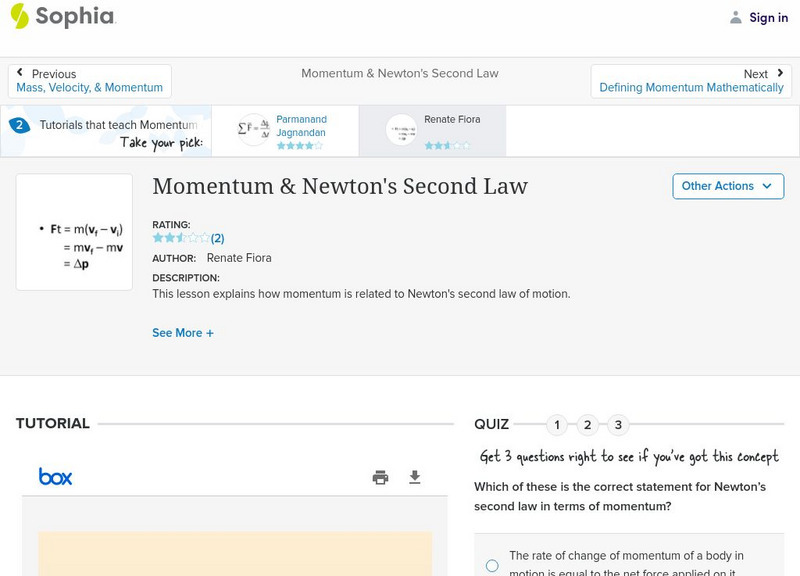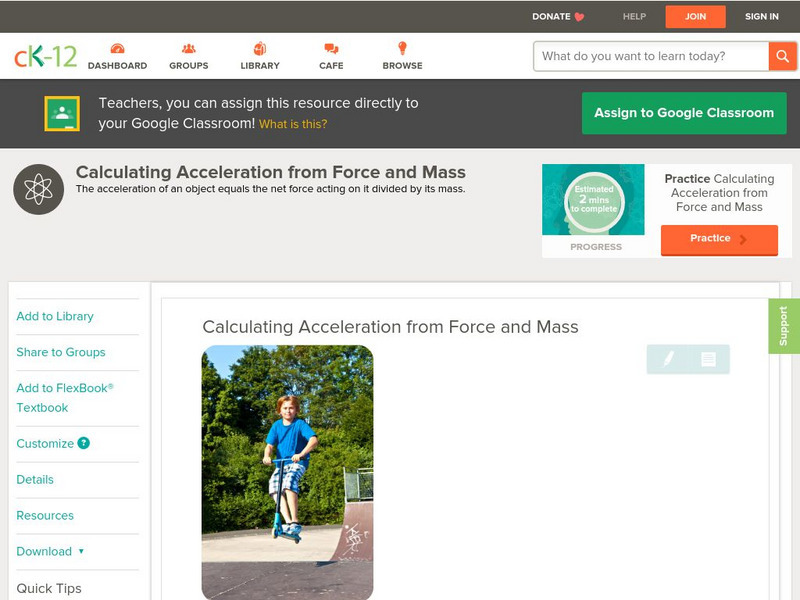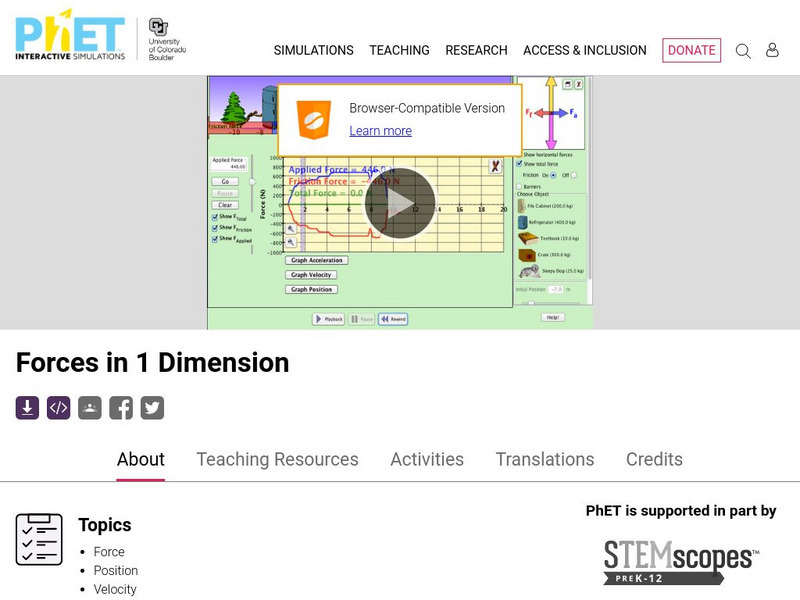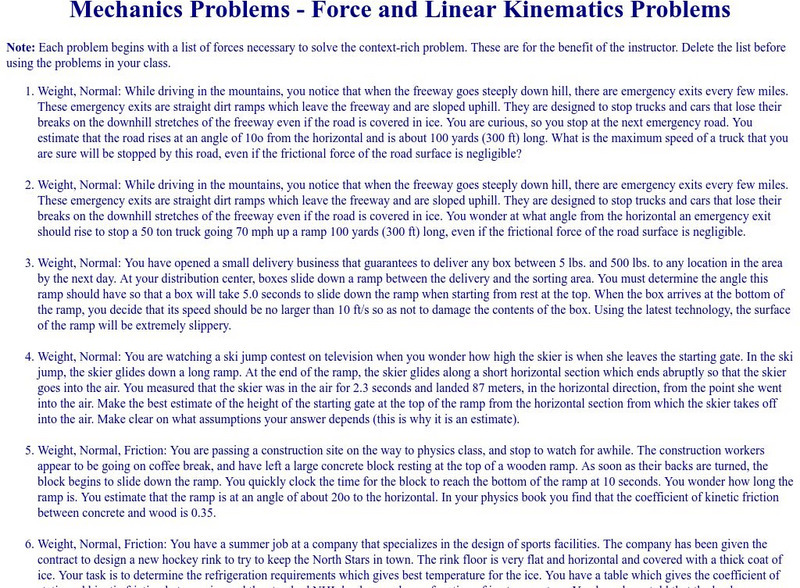Hi, what do you want to do?
CK-12 Foundation
Ck 12: Physics Simulation: Drawbridge
[Free Registration/Login Required] Learn about torque balance in the context of a medieval drawbridge using this interactive simulation. A PDF worksheet and a video tutorial are also available. [3:47]
CK-12 Foundation
Ck 12 Exploration Series: Simulations: Physics: Newton's Cannon
[Free Registration/Login Required] Learn about orbits and how an object can stay in orbit under the influence of gravity. By adjusting launch velocities users will understand how to successfully put a virtual satellite into orbit without...
Annenberg Foundation
Annenberg Learner: Amusement Park Physics: Roller Coaster
This interesting and interactive exhibit demonstrates how Newton's Laws of Motion impact the design and safety of roller coasters.
University of New South Wales (Australia)
University of New South Wales: School of Physics: Physclips: Newton's Laws
Physiclips thoroughly presents Newton's laws with animations and film clips.
Physics Classroom
The Physics Classroom: Circular and Satellite Motion: Newton's 2nd Law Revisited
In this interactive module, students use free-body diagrams, Newton's second law equation, and circular motion concepts to analyze a variety of physical situations involving the motion of objects in circles or along curved paths.
CK-12 Foundation
Ck 12: Physics Simulation: Hot Air Balloon
[Free Registration/Login Required] Learn about Newton's 2nd Law - the relationship between force, mass, and acceleration for a hot air balloon using this interactive simulation. A PDF worksheet and a video tutorial are also available....
CK-12 Foundation
Ck 12: Physics Simulation: First Law Simulation
[Free Registration/Login Required] In this simulation, students investigate the question of whether force is required to keep a sled moving on ice.
Sophia Learning
Sophia: Momentum & Newton's Second Law
This lesson explains how momentum is related to Newton's second law of motion.
CK-12 Foundation
Ck 12: Physical Science: Calculating Acceleration From Force and Mass
[Free Registration/Login may be required to access all resource tools.] How to calculate acceleration from force and mass, and force from mass and acceleration.
Physics Classroom
The Physics Classroom: Newton's Laws
A four-lesson e-textbook covering topics in Newton's Laws. Tutorials include informational text,animations, interactive activities, and quick, interactive comprehension checks throughout the lessons.
American Association of Physics Teachers
Com Padre Digital Library: Open Source Physics: Swinging Atwood's Machine Model
Variation on the standard Atwood's Machine model, where one hanging mass swings like a pendulum and the other remains stationary. Manipulate the conditions and observe the results.
University of Colorado
University of Colorado: Ph Et Interactive Simulations: Forces in One Dimension
Use this simulation to see the results of applying a force to move an object. Analyze forces and friction using graphs.
University of Minnesota
University of Minnesota: Mechanics Problems: Force and Linear Kinematics Problem
This University of Minnesota site provides a series of contextually rich problems pertaining to force, Newton's second law of motion, and linear kinematics.
Libre Text
Libre Text: Pressure Gradients
From high school geography class, you may remember that "air tends to flow from high pressure to low pressure". To understand why this happens, it is key to realizing that gasses (but also liquids) exert a force on their surroundings...
Physics Classroom
The Physics Classroom: Newton's Laws: Elevator Ride Interactive
Have you ever felt that queasy feeling in a moving elevator? Explore the physics behind the sensations of weightlessness and weightiness. Teacher notes and a downloadable handout are also provided.
Physics Aviary
Physics Aviary: Practice Problems: Car on a Turn Problem
Students must determine the force of friction on a car on a turn and the maximum speed the car could navigate a turn.
TeachEngineering
Teach Engineering: Sliding Textbooks
In this culminating activity of the unit which highlights how forces play a role in engineering design and material choices, students explore and apply their knowledge of forces, friction, acceleration, and gravity in a two-part experiment.
Physics Classroom
The Physics Classroom: Newton's Laws: The Big Misconception
While most people know what Newton's laws say, many people do not know what they mean. This tutorial allows students the ability to understand their meaning and to believe their implications.
Physics Classroom
The Physics Classroom: Newton's Laws: Finding Individual Forces
Through illustrated examples and interactive practice problems, students find the value of forces acting upon objects using force equations.
Science Education Resource Center at Carleton College
Serc: Investigating Projectile Motion: Creating a Catapult
This activity is for 9th grade physical science young scholars. It begins with an inquiry-based activity using a projectile motion computer simulation. It culminates with students building a catapult; applying and connecting science...
Physics Aviary
Physics Aviary: Newton's Law Lab
This lab was designed to have students investigate the factors that affect the acceleration of an object on a frictionless horizontal surface. The simulation will give the students a position vs. time graph and a velocity vs. time graph....
Physics Aviary
Physics Aviary: Newton's Law Lab With Photogates
This lab was designed to have students investigate the factors that affect the acceleration of an object on a frictionless horizontal surface. The simulation will give the students data from two photogates which they must use to find the...
Physics Aviary
Physics Aviary: Newton's Law Lab
This lab was designed to have students investigate the factors that affect the acceleration of an object on a frictionless horizontal surface. The simulation will give the students position vs. time data and they will have to determine...
Other
Institute of Physics: Newton's Cradle
The interactive simulation demonstrates the conservation of momentum through a Newton?s Cradle simulation.















